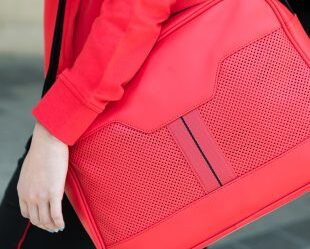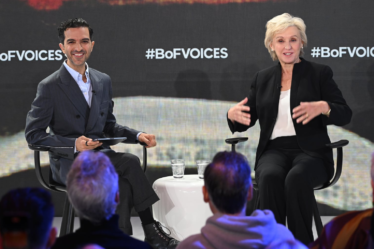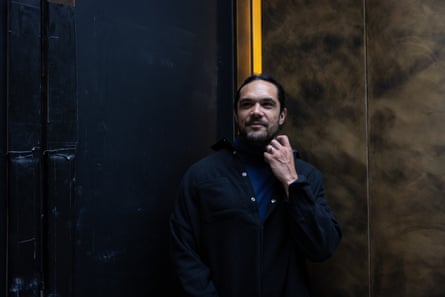
As a child, Nick Afoa imagined a life travelling the world – not as the musical theatre performer he’s become but as the champion rugby player he might have been. As we set off from AAMI stadium, passing under the coloured rings that overhang Olympic Boulevard towards the Yarra, thoughts of sporting prowess come to mind.
“I played in the New Zealand under 19s and we won the World Cup in South Africa,” Afoa says, without a hint of swagger. “That’s the peak of achievement at that level, and the next step was playing professional. It was make or break … and I broke.”
He’s referring to the ACL (anterior cruciate ligament) injury that occurred during a routine game in Singapore, a moment that closed the door on Afoa’s football career in an instant. “I could hear it before I felt it. And while athletes do come back from those kinds of injury, you lose a gear of speed. I was a back and needed my speed.”
It was a bleak time for a young man who thought he knew the path his life was going to take. “I ballooned, put on 20kgs, I was drinking a lot. I just couldn’t see a way forward.”
We head down to the riverbank, leaving behind the massive trucks turning noisily on to Batman Avenue. The weather forecast told us it was going to be warm but the morning has been squally and overcast and Afoa seems dressed for a London winter.
“The thing is, maybe I wouldn’t have made it [as a professional rugby player]. You see kids who make the professional teams at 18 or 19 these days, they are so dedicated. Maybe this was my path all along.”
There is a kind of offhanded wisdom about Afoa that seems innate, although it’s also clear his family – as well as mentors, coaches and directors – have shaped the person he’s become.
“I was born and raised in New Zealand. My dad is Samoan and my mum is a Croatian Kiwi, and while I’d been to Samoa when I was a kid, I’d never felt that connected to my Croatian heritage until I went there, just a few years ago.” It came during a short break in the West End run of Disney’s The Lion King, where Afoa played the eponymous hero.
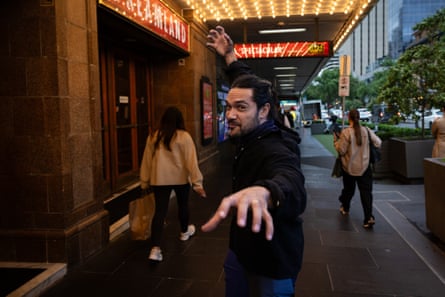
“It was a missing piece in my life,” he says. He tracked down his grandfather’s home town, and found family he’d never met before. “My nan, born in New Zealand, had never been back [to Croatia]. My mum, born in New Zealand, never been back. The story of people leaving Croatia is huge, but this was a real homecoming. I felt called.”
Afoa is a man attuned to callings and aware of how painful it can feel when they aren’t answered. While it seems his story is separated clearly into a rugby half and a musical theatre half, he’d felt the pull of those two disciplines early on. “My drama teacher would be wanting me for rehearsals and my rugby coach would be asking for a few more minutes of training.”
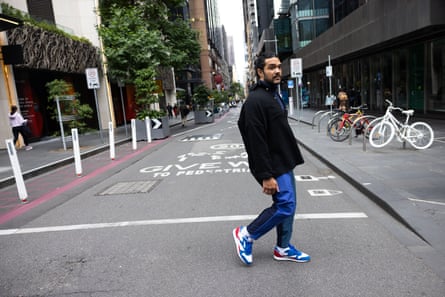
And even at the height of his interest in football, theatre was dangling its fruit over the fence in the background. “I actually auditioned for the original Australian tour [of Lion King] back in 2003. I made it to the final callbacks when I was 19, the same time I was going to South Africa for the World Cup. I got an email asking me to be an alternate Simba in London.” Afoa shrugs, sheepish. “I turned it down.”
after newsletter promotion
As we head towards Swanson St and the pebbled path widens to take in the five metal shields representing the five groups of the Kulin nation, the weather also opens out, blue skies peaking through all the bunched white of the clouds.
It must have seemed, when his rugby career ended and he’d shut the door on a major theatre opportunity, that he’d lost his chance. “That was real hard. I felt like I’d lost everything for a while.” But Simba came calling one more time. “Ten years later, it came round again,” Afoa says as he slaps one hand into his fist. “And I thought, I’m ready for this.”
While he needed to make many adjustments in his move from athlete to actor – “physically I had to transform the way I moved, I had to lengthen my muscles, do ballet” – he’d learned an enormous amount about discipline and grit from his athletic youth; it put him in good stead for the resilience needed to play eight shows a week for months at a time.
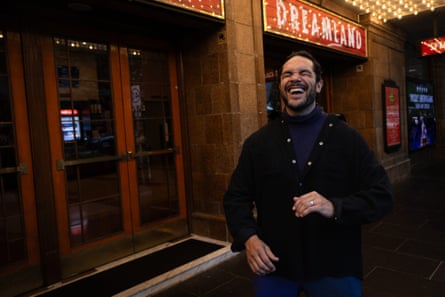
Afoa is in Melbourne with the touring production of Miss Saigon, where he plays John, the brash and belligerent US soldier who matures into an activist and humanitarian by story’s end. It represents a maturing of his work as an actor – “I was ostensibly playing a version of myself in Lion King” – but it also plunges him into the controversy that plagues the musical still, a controversy around race. One of the show’s central parts was initially played in yellowface by the actor Jonathan Pryce, and the sexualisation of Asian women on stage continues to rankle. While not written specifically as such, John is a part often played by a non-white actor.
The wind picks up when we turn into the upheaval of roadworks outside Federation Square, and weave our way through the streets, past the rear of the Regent theatre. We talk about this phenomenon, of certain roles being considered acceptable for non-white actors, as long as they aren’t the romantic lead or main character. “Blind casting” is something of a Band-Aid solution to racial inequality in the theatre, but Afoa believes that specificity is important too.
“I had a crisis early in rehearsal, because Nigel [Huckle, who play’s John’s best mate Chris] turned to me and asked what nationality I was playing. Was I playing African American, was I Hispanic? It wasn’t until I did some research and discovered that there were Samoan and Pacific peoples who fought for the Americans in Vietnam, that it finally clicked.”
Drawing on his cultural heritage has always paid off for Afoa – “my Simba was very informed by Samoan culture, there was a rawness to it, I guess” – and it gives his John a complexity and assuredness, but also inner conflict the audience senses rather than sees. “A lot of those Samoan soldiers were conflicted when they stepped off those helicopters. Because the Vietnamese people lived so closely to the way Samoan people lived back in the islands.”
We turn on to Exhibition St and end up outside Her Majesty’s, where Miss Saigon is playing. The warmth that was promised earlier finally arrives and Afoa takes off his thick woollen coat. “This history is really close. We have people in this show whose parents and grandparents were there during the fall of Saigon. I think we need to honour that.”
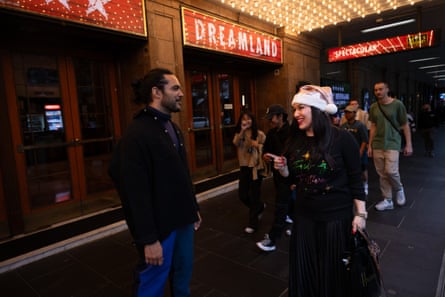
Afoa follows Miss Saigon with the role of Collins in Rent, which will reunite him with his wife, Josslynn Hlenti. They met playing the young lovers, Simba and Nala, in The Lion King, and have struggled with scheduling conflicts since. “We have an 18-month-old, so it’s getting tricky with all this international travel. Maybe we’ll settle down one day.”
It doesn’t seem likely any time soon. With such a peripatetic lifestyle though, it pays to focus on the here and now. “I’m gonna take some time in Melbourne to do some more walking – even that beautiful walk we just did – with the wife and bubba. Enjoy what’s here in front of us.”
-
Miss Saigon is playing at Her Majesty’s theatre Melbourne until 16 December, then at Festival theatre Adelaide from 2 to 28 January 2024.


